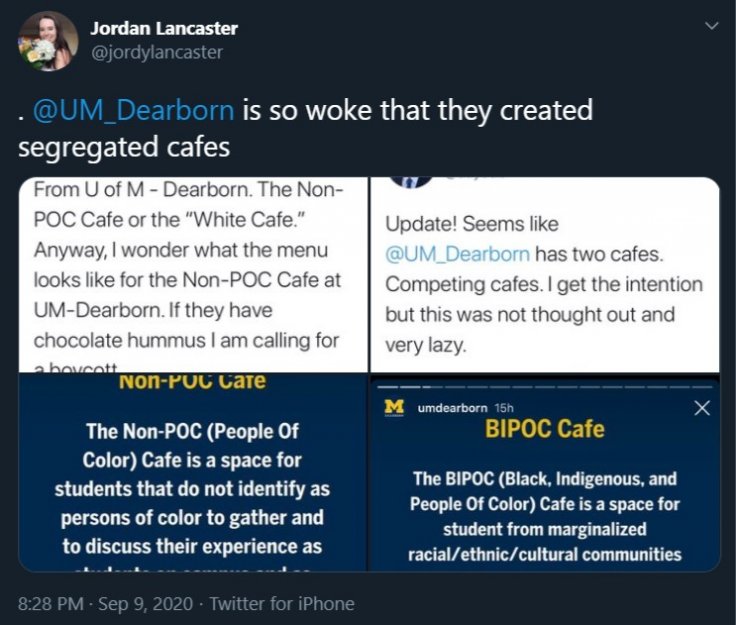The University of Michigan-Dearborn (UM-Dearborn) landed in the soup for creating two separate virtual students' "cafes" for people of color and white people or as it described "non-POC" (people of color). The move was slammed on Twitter and users questioned the legality of the cafes based on segregation of race.
The university advertised the events — organized by the Center for Social Justice and Inclusion — on its social media pages and its website, which were pulled down after outcry. However, the online link was archived before the institute took it down and some social media users took screenshots of the descriptions of the virtual events.

The UM-Dearborn described the event for white students as a platform to share their experiences as "non-POC" on and off-campus. Similarly, the institute encouraged the people of color to share their experiences of being a part of marginalized racial, ethnic, cultural communities. The separate online meet-ups were scheduled to be bi-monthly starting every first Tuesday of the month.
From U of M - Dearborn. The Non-POC Cafe or the “White Cafe.†Anyway, I wonder what the menu looks like for the Non-POC Cafe at UM-Dearborn. If they have chocolate hummus I am calling for a boycott. pic.twitter.com/8ZegRv7zet
— Abed A. Ayoub (@aayoub) September 9, 2020
The events triggered social media users who asked whether such segregation based on races was legal. Most Twitter users were left in shock and some expressed concern about how the university went ahead with the idea. However, some users said the events reflected reverse racism and accused the university of racial segregation "under the guise of equality."
"Uhh....this kind of behavior is exactly why I'm no longer with the left. This is actual segregation under the guise of "equality". What in the actual," wrote one Twitter user.

The UM-Dearborn issued an apology and said the descriptions of the online events did not reflect the university's "commitment to diversity, equity and inclusion." The university also clarified that the virtual cafés were not meant to be exclusive or exclusionary for individuals of a certain race.
"The 'cafes' were virtual open conversations developed to allow students the opportunity to connect to process current events, share their experiences related to race, share knowledge and resources and brainstorm solutions," the UM-Dearborn said.

The university explained the idea behind the "non-POC" event was to provide an opportunity for students to expand their understanding of race and racism without relying on students of color to educate them.
Abed Ayoub, legal and policy director of the American-Arab Anti-Discrimination Committee, told the Associated Press that he understood the university's intention but said it could have executed the idea in a better way. "It seemed that opportunity was missed intentionally," Ayoub said, adding, "We know this is a mistake but hope they move forward."










